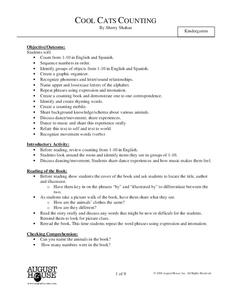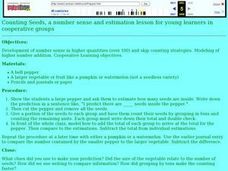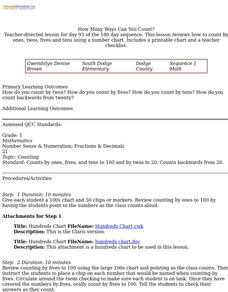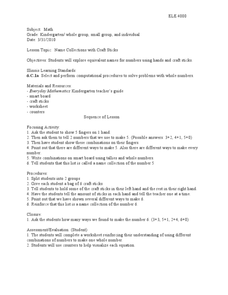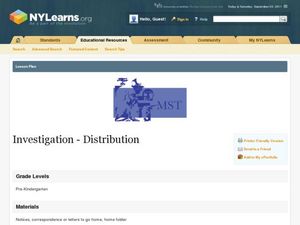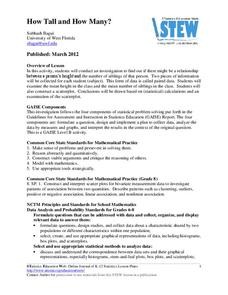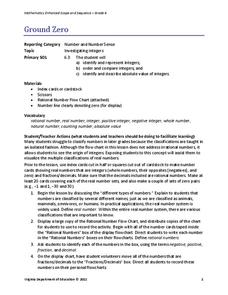Curated OER
Maya Math: From Zero to Nineteen
Students explore counting methods of the ancient Maya, and practice identifying Maya number glyphs.
Illustrative Mathematics
Christina's Candies
Help Christina figure out how many chocolate and lemon candies she has with a lesson on decomposing numbers. When presenting this context to the class, the teacher chooses the total number of candies and the number that are chocolate,...
Curated OER
Cool Cats Counting
Students practice number sense with the book Cool Cats Counting by Sherry Shahan. In this number lesson, students listen to the book and count from 1-10 in English and Spanish. They practice their alphabet, rhyming words, and...
Curated OER
Counting Seeds
Students practice skip counting strategies, estimation, and higher number addition. They estimate the number of seeds in bell pepper, and count seeds in groups of tens and ones after the teacher removes seeds from the pepper.
Curated OER
How Many Ways Can You Count?
Youngsters chorally count to 100 by 1s, 2s, 5s, and 10s, and backwards from 20, using chip markers and a hundreds chart. Includes a printable chart and a teacher checklist for assessing mastery.
Curated OER
Name Collections with Craft Sticks
Groups of Kindergarten students count craft sticks in different groups and name how many they have. They complete simple addition to ten with the use of manipulatives.
Virginia Department of Education
Modeling Division of Fractions
Provide a meaningful context for learning about the division of fractions with this upper-elementary math lesson. Presented with a simple, real-world problem, young mathematicians work in small groups to develop visual models...
Illustrative Mathematics
How Many _______ Are In. . . ?
Help your learners gain meaningful understanding of dividing fractions using fraction models. The activity includes nine problems which are sequenced to show how the fraction division algorithm evolves. Have learners use graph paper or...
Curated OER
How Many Raisins?
Students study the concept of addition. They create verbal number stories with numbers from one to five. They draw a slice of bread with a line down the middle and cut the bread shapes out of a "slice of bread" and a handful of raisins,...
Curated OER
Investigation: Distribution
Students explore counting by sharing snacks at a class party. In this number sense lesson plan, students discuss sharing items equally by counting out equal numbers of an item they intend to give each student in the class. Students...
Curated OER
Agriculture Counts
Students practice counting. In this early numbers lesson, students learn about the beginnings of agriculture and how it ties into math. Students practice counting objects related to agriculture.
EngageNY
Logarithms—How Many Digits Do You Need?
Forget your ID number? Your pupils learn to use logarithms to determine the number of digits or characters necessary to create individual ID numbers for all members of a group.
Curated OER
Further Investigating Greater Than, Less Than, and Equal to
Students investigate number relationships such as greater than, less than, and equal to. In this number relationship lesson, students use number mats and a fish with a large, open mouth to practice showing number relationships.
Mathematics Assessment Project
Sampling and Estimating: Counting Trees
Your task today: count all the trees on a tree farm. To complete the assignment, learners first estimate the number of trees on a tree farm using random sampling. To improve their own response they then evaluate provided...
American Statistical Association
How Tall and How Many?
Is there a relationship between height and the number of siblings? Classmates collect data on their heights and numbers of brothers and sisters. They apply statistical methods to determine if such a relationship exists.
American Statistical Association
Happy Birthday to . . . Two?
How many people do you need in a room before two likely share the same birthday? Scholars consider this puzzle by analyzing a set of data. They ponder how to divide the data and determine the proper size of a group for this event to...
Curated OER
Teaching Arithmetic and Math Concepts to Headstarters
Students discover early number concepts for numbers 1 through 5. In this number concepts lesson, students work in stations doing hands-on activities such as sorting colored blocks, stringing beads, and counting sticks. Students also...
Curated OER
What Makes Ten
Students investigate the concept of ten and how it is part of the real number system. They find the quantity of ten using as many combinations as possible. They can count using manipulatives, write on paper, or by doing mental math.
Virginia Department of Education
Ground Zero
Don't harbor any negative feelings toward negative numbers. Scholars learn about different classifications of rational numbers, including negative integers. They also develop definitions of the opposite and the absolute value of a...
EngageNY
Modeling with Quadratic Functions (part 2)
How many points are needed to define a unique parabola? Individuals work with data to answer this question. Ultimately, they determine the quadratic model when given three points. The concept is applied to data from a dropped...
Curated OER
Mystery Number
Students explore numbers 1-100. In this cross curriculum literacy and numeration instructional activity, students listen to the book More or Less by Stuart J. Murphy. Students play a game with a partner in which they guess the...
Curated OER
Counting Zero to Five
Students are introduced to the numerals zero through five. They associate the numeral with the correct number of objects. Students comprehend the quantities zero through five showing "How many?" by counting their fingers or using a...
Curated OER
Number Books
Students construct a book to illustrate number concepts. They write their numbers on a sheet of paper. Students in grade 1 discuss counting to 100 by different numbers. Pupils in grades (2-4) write basic addition or subtraction story...
Curated OER
How Much is a Million?
Students discover the magnitude of the number 100. The sense of the number is developed by allowing students to experience 100 by counting it, measuring it, feeling it, and doing it, hands-on


